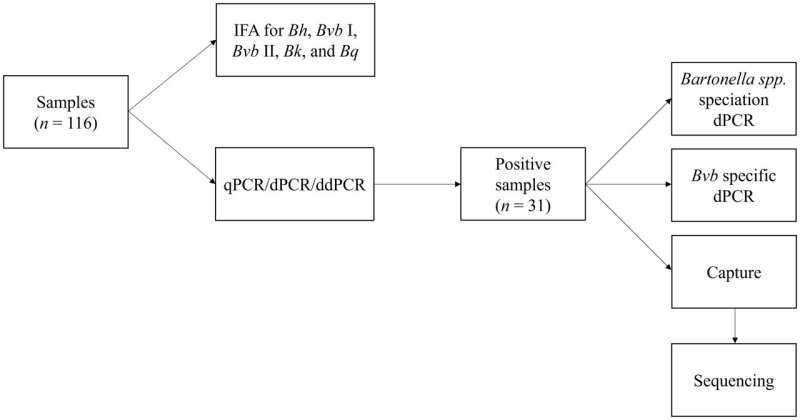This article has been reviewed according to Science X's editorial process and policies. Editors have highlighted the following attributes while ensuring the content's credibility:
fact-checked
peer-reviewed publication
trusted source
proofread
Bartonella DNA found in blood of patients with psychosis

A new study has found that patients diagnosed with schizophrenia or another psychotic disorder are three times more likely to have Bartonella DNA in their blood than adults without these disorders. The work further supports the idea that pathogens—particularly vector-borne pathogens—could play a role in mental illness.
Bartonella are a group of vector-borne bacteria transmitted primarily via arthropods like fleas, lice and potentially ticks, but also by the animals that harbor them. For example, the species Bartonella henselae is associated with cat scratch disease, which until recently was thought to be a short-lived (or self-limiting) infection. There are at least 45 different known Bartonella species, of which 18 have been found to infect humans.
Improved methods for detecting Bartonella infection in animals and humans have led to the diagnosis of bartonelloses in patients with a host of chronic illnesses, as well as in some patients with psychiatric symptoms.
In this latest study published in the journal Frontiers in Psychiatry, researchers at North Carolina State University analyzed the blood of 116 people for evidence of Bartonella DNA and Bartonella specific antibodies. The samples were collected during a biomarker research study conducted by Dr. Shannon Delaney and colleagues at the Columbia University Irving Medical Center (CUIMC).
Of the 116 people, 29 were in the control group; 16 were prodromal, meaning they had symptoms but no formal diagnosis; 51 were children, adolescents or adults with psychosis; and 20 were close relatives of those diagnosed with psychosis.
In a previous study conducted at Columbia, these same patients had been tested for increased inflammatory mediators—in other words, evidence of inflammation. That study found that patients with psychosis were more likely to have increased inflammatory markers in the blood.
"As an infectious disease researcher, I believe that infection should be critically examined as a potential cause of diseases for which the cause is unclear or unknown," says Dr. Edward Breitschwerdt, Melanie S. Steele Distinguished Professor of Internal Medicine at NC State.
"We wanted to explore potential drivers of inflammation in patients with neuropsychiatric illnesses. Based on the associations I've seen between Bartonella and symptoms of mental illness in my prior work, Bartonella infection could be one possible candidate."
In a blinded study, the NC State team used immunofluorescence assays and digital droplet PCR testing to detect and amplify DNA in the blood samples. As the blood samples had been frozen and stored, the researchers did not attempt to culture bacteria from them. Culturing the bacteria can further enhance DNA detection.
Forty-three percent of participants diagnosed with psychosis had Bartonella DNA in their blood compared to 14% in the control population. Additionally, using DNA sequencing, the team was able to identify the Bartonella species for 18 of the 31 participants with Bartonella in their blood, including infection or co-infection with Bartonella henselae (11/18), Bartonella vinsonii subsp. berkhoffii (6/18), Bartonella quintana (2/18), Bartonella alsatica (1/18), and Bartonella rochalimae (1/18)
This is the second study to identify Bartonella in the blood of psychiatric patients. A 2020 study, interrupted by the COVID pandemic, found Bartonella species DNA in 11 of 17 (65%) University of North Carolina School of Medicine patients with schizophrenia versus one of 13 (8%) in healthy volunteer controls.
"We've now demonstrated the presence of Bartonella species in the blood of two separate cohorts of patients with neuropsychiatric symptoms, which indicates that these bacteria are worth studying further as a potential driver of these symptoms," Breitschwerdt says. "At the very least, we need to continue to see if these findings are replicated in other patient populations."
"This study provides further support for an association between Bartonella species infection and psychosis and may have important clinical implications," notes Dr. Brian Fallon of CUIMC. "However, it is worth emphasizing that association does not prove causality; other factors may account for the association.
"The other significant finding was that the frequency of positive antibody tests for Bartonella infection was not significantly different for the controls versus the individuals with psychosis; this suggests that exposure to Bartonella is common in the general population and that reliance on serologic test results alone can be misleading."
Dr. Delaney is first author. Cynthia Robveille, assistant research professor at NC State, is co-first author. Drs. Breitschwerdt and Fallon are co-corresponding authors. Other NC State co-authors include Research Professor Ricardo Maggi, former Ph. D. student Dr. Erin Lashnits, junior research scientist Emily Kingston, and graduate research assistant Chance Liedig. Research RN Lilly Murray from Columbia University also contributed to the work.
More information: Delaney et al. Bartonella species bacteremia in association with adult psychosis. Frontiers in Psychiatry (2024). DOI: 10.3389/fpsyt.2024.1388442, www.frontiersin.org/journals/p … yt.2024.1388442/full

















